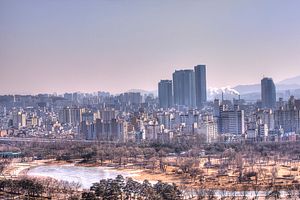The current tensions between Japan and South Korea have led to calls in South Korea to reduce the country’s dependence on Japan for parts, materials, and equipment used in its key industries. This, in turn, has brought to the fore the issue of how this supply chain dependence came about and what can be done to change it. Japan’s weaponization of trade, which drastically escalated these tensions, is likely to invite self-defeating repercussions and should serve as a warning to other nations.
The truth is that Japan has played a key role in South Korea’s economic development. The current tensions have only brought home in South Korea the unpleasant reality of this fact. In the early 1960s, South Korea was one of the poorest countries in the world. A recipient of U.S. economic aid after the ravages of the Korean War, the country had made some progress in reconstruction and was improving its human capital base by investing in education. However, it subsequently underwent rapid economic development under the leadership of President Park Chung-hee, who came to power in 1961. Park had been trained in a Japanese military academy and served in the Japanese military during Japan’s colonial rule over Korea.
Park saw Japan as a model for South Korea’s economic development and normalized diplomatic relations with Tokyo in 1965 despite large-scale protests in South Korea. With normalization, Japan became the most important source of capital, know-how, parts, materials, and capital equipment for South Korea’s industries. In a sense, South Korea, which had been a part of the Japanese empire earlier in the 20th century, became reincorporated into a Japanese economic sphere as Japan began to play a key role in its economic development under Park.
Under this Japan-influenced economic development, South Korea’s firms developed close relationships with Japanese firms and came to depend on them for parts, materials, and capital equipment. This supply chain dependence led to a structural feature of South Korea’s economy whereby the country recorded persistently large trade deficits with Japan. The more South Korean firms exported their goods, the more they needed to import key parts, materials, and capital equipment from Japan. Although South Korea later came to reduce this dependence somewhat, the country is still dependent on Japan to a significant extent.
Therefore, when Japan recently announced export restrictions on three chemicals indispensable to South Korea’s semiconductor and display industries, it came as a rude awakening in Seoul to the dangers of its dependence on Japan. Facing the urgent need to find alternative sources for the parts, materials, and equipment used in its key industries, South Korea’s government met with the country’s business leaders and announced a program to promote domestic industries for those parts, materials, and equipment. South Korea’s prime minister remarked that Seoul could turn this crisis into an opportunity by using it as the catalyst to overcome an unhealthy dependence on Japan.
How soon and how successfully South Korea will be able to build these industries to substitute imported Japanese parts, materials, and equipment remains to be seen. Meanwhile, Japan’s weaponization of trade in this case has troubling ramifications for its own national interest. Watching how Japan turned South Korea’s dependence on it against itself may make many nations think twice before welcoming Japanese capital and goods into their economies. Recent critics of China have charged that Chinese capital and goods create an unhealthy dependence in recipient countries that China can later turn against those same countries. Likewise, Japan’s politicization of trade is likely to subject Japanese capital and firms to scrutiny in other countries.
Japan’s business community needs to lobby their own government against the politicization of trade, as they are the ones who suffer when their government puts restrictions on their exports and other countries boycott their goods and services because of political reasons. It is not good for Japan if its firms make excellent products, but cannot sell them overseas because other countries distrust the Japanese government.
As politicization of trade affects more nations around the world, more nations will likely come under pressure to engage in import substitution so as to reduce their dependence on other nations. As no nation can be expected to produce everything it needs, this is detrimental to international division of labor and efficient allocation of resources in the global capitalist economy. Nations must realize that politicizing trade is a self-defeating game in which everyone loses and step back from the abyss.
Jongsoo Lee is Senior Managing Director at Brock Securities and Center Associate at Davis Center for Russian and Eurasian Studies, Harvard University. The opinions expressed in this essay are solely his own. He can be followed on Twitter at @jameslee004

































